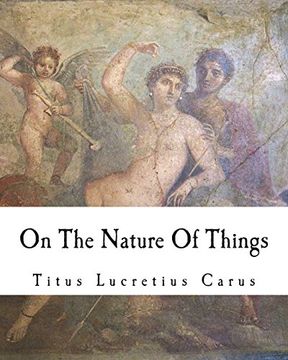Compartir
On the Nature of Things: De Rerum Natura (en Inglés)
Titus Lucretius Carus
(Autor)
·
Createspace Independent Publishing Platform
· Tapa Blanda
On the Nature of Things: De Rerum Natura (en Inglés) - Leonard, William Ellery ; Carus, Titus Lucretius
Elige la lista en la que quieres agregar tu producto o crea una nueva lista
✓ Producto agregado correctamente a la lista de deseos.
Ir a Mis Listas
Origen: Estados Unidos
(Costos de importación incluídos en el precio)
Se enviará desde nuestra bodega entre el
Lunes 24 de Junio y el
Lunes 08 de Julio.
Lo recibirás en cualquier lugar de Argentina entre 1 y 3 días hábiles luego del envío.
Reseña del libro "On the Nature of Things: De Rerum Natura (en Inglés)"
On the Nature of Things: by Titus Lucretius Carus. A Metrical Translation by William Ellery Leonard. De rerum natura is a first-century BC didactic poem by the Roman poet and philosopher Lucretius (c. 99 BC - c. 55 BC) with the goal of explaining Epicurean philosophy to a Roman audience. To the Greek philosopher Epicurus, the unhappiness and degradation of humans arose largely from the dread which they entertained of the power of the deities, from terror of their wrath. This wrath was supposed to be displayed by the misfortunes inflicted in this life and by the everlasting tortures that were the lot of the guilty in a future state (or, where these feelings were not strongly developed, from a vague dread of gloom and misery after death). Epicurus thus made it his mission to remove these fears, and thus to establish tranquility in the minds of his readers. To do this, Epicurus invoked the atomism of Democritus to demonstrate that the material universe was formed not by a Supreme Being, but by the mixing of elemental particles that had existed from all eternity governed by certain simple laws. He argued that the deities (whose existence he did not deny) lived forevermore in the enjoyment of absolute peace-strangers to all the passions, desires, and fears, which affect humans- and totally indifferent to the world and its inhabitants, unmoved alike by their virtues and their crimes. This meant that humans had nothing to fear from them.
- 0% (0)
- 0% (0)
- 0% (0)
- 0% (0)
- 0% (0)
Todos los libros de nuestro catálogo son Originales.
El libro está escrito en Inglés.
La encuadernación de esta edición es Tapa Blanda.
✓ Producto agregado correctamente al carro, Ir a Pagar.

